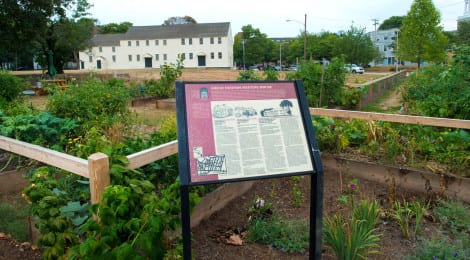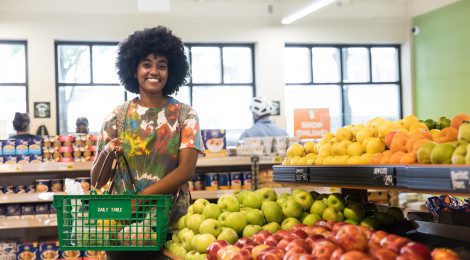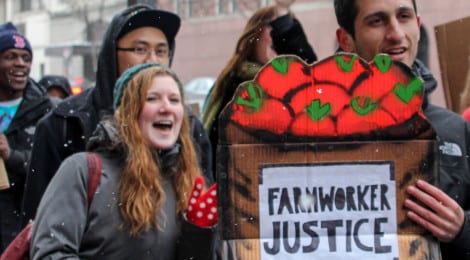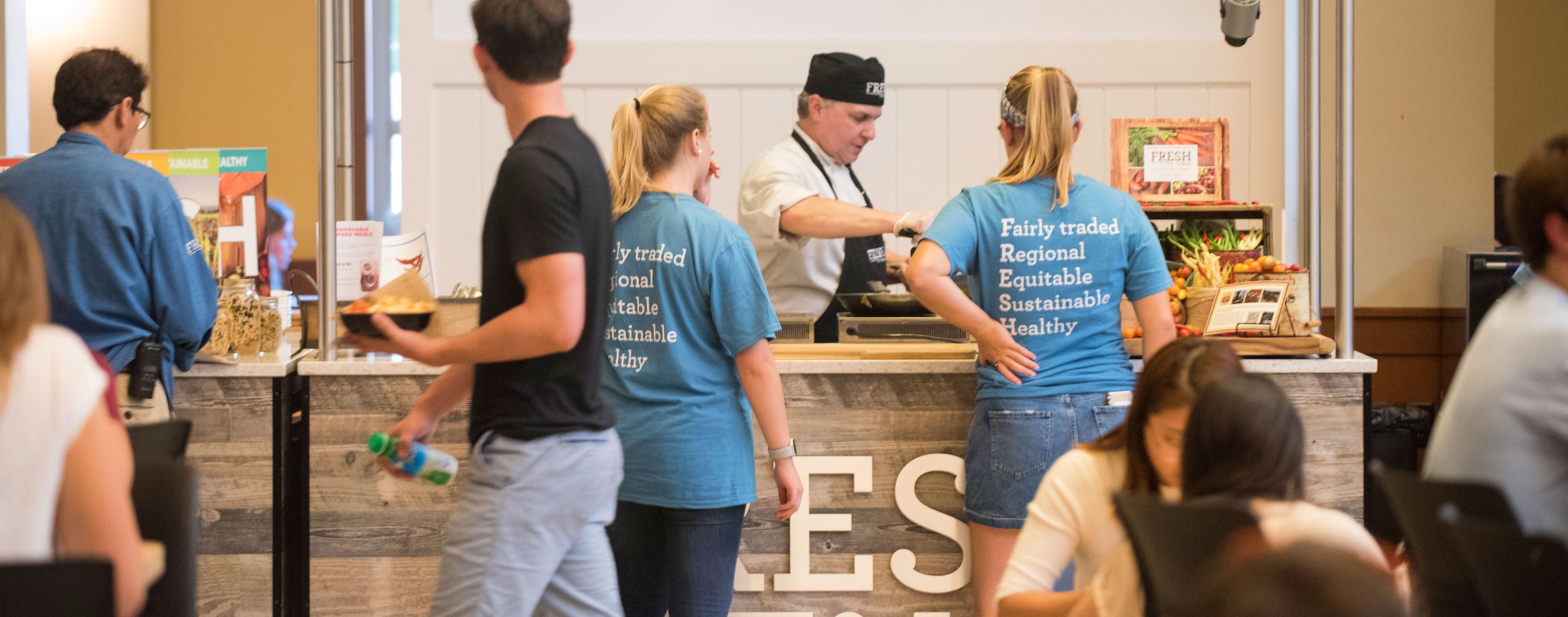
Grantee Profile
FRESH to Table Dining
What would it take to make a grilled cheese sandwich with ingredients sourced only from within 100 miles of Boston? Vermont cheddar cheese and locally-produced bread are easy enough to find at the farmers market or grocery store. But how do you ensure the wheat that goes into the bread is local? What about the salt? These are some of the questions that Boston College (BC) Dining Services and student group Real Food BC (a chapter of the national organization Real Food Challenge) asked each other ten years ago, and have been striving to answer ever since.
BC students spend more time interacting with their food than with any class or professor, a recent internal analysis revealed. While most students may assume that interaction stops at dining hall doors, BC Dining staff know that students’ food choices radiate much farther. “The food decisions you make [on campus] have a far-reaching social impact,” explains Sean Canny, Assistant General Manager at Corcoran Commons, one of BC’s largest dining halls. Megan O’Neill, Associate Director of Operations, elaborates that while the BC student body is highly engaged in food-related social justice issues in other U.S. states and abroad, they often don’t recognize how those same challenges impact BC’s local communities as well. Food insecurity in particular is something to which O’Neill says students don’t often connect their eating choices. But when BC Dining Services sources sweet potatoes from a local farm through their distributor, and students choose to purchase meals made with that produce, BC helps ensure that the farmers who grow those potatoes are payed living wages to support their own families. It’s all about “putting two and two together” for students, she says.
To make these kinds of connections clearer to students and create a more sustainable dining program, BC Dining leadership has implemented a variety of changes over the past decade. The shift began with the establishment of a seasonal, weekly farmers market outside Corcoran Commons and a commitment to making BC Dining’s food purchasing more sustainable and regionally-focused. BC has a lot of purchasing power when it comes to food procurement; they serve 22,000 a la carte meals every day. Within an a la carte dining system, students use points to pay for each meal, rather than paying a single price at all-you-can-eat dining halls. This means that dining services receives real-time feedback on student preferences, which then influences the demand that BC Dining uses to determine its food purchasing. Pat Ryan, Assistant Director of Purchasing and Nutrition, has spent the last decade setting and meeting sustainable food purchasing goals. But Ryan and her colleagues are also conscious of the time it takes new local production systems to develop. “It’s not an overnight process,” says Derrick Cripps, General Manager at Corcoran Commons. “There’s always that balance between trying to get a supply chain that works for everyone as well as being financially sound in the choices that we make,” agrees Ryan.
Overall, though, Ryan says that it’s a collaborative relationship among schools, distributors, and vendors. Suppliers understand that they need “to get on board” with establishing new supply chains as colleges and universities adjust the kinds of products they demand. One such supplier is North Coast Seafoods. Andrew Wilkinson, Seafood Specialist for North Coast Seafoods’ Culinary Division, says that North Coast is committed to sustainability, and that they have been long before institutions like BC began demanding better freshness, sustainability, and price from suppliers. North Coast promotes a nuanced understanding of seafood sustainability, supplying BC with underutilized, local fish like pollock and white hake, as well as BAP (Best Aquaculture Practices)-certified farmed salmon from Northern Harvest Sea Farms in Newfoundland and MSC (Marine Stewardship Council)-certified wild-caught haddock from Alaska.
Wilkinson says that many schools come to North Coast thinking about sustainable seafood only in terms of wild fish population management and food miles – how far food travels from its production site to consumers’ plates. But the reality of building sustainable economies, livelihoods, and ecosystems around seafood is more complex than that. “My mission is to increase healthy seafood consumption for our young people,” says Wilkinson, which to him means providing schools with a steady supply of tasty fish that purchasers, chefs, and students can trust. He performs a balancing act of meeting BC’s demand for local catch while also educating its purchasers and chefs about both local and global sustainable seafood. “It’s understanding each other’s business profile,” Wilkinson explains, as well as promoting sustainability on for the good of fishermen, consumers and their health, and the environment.
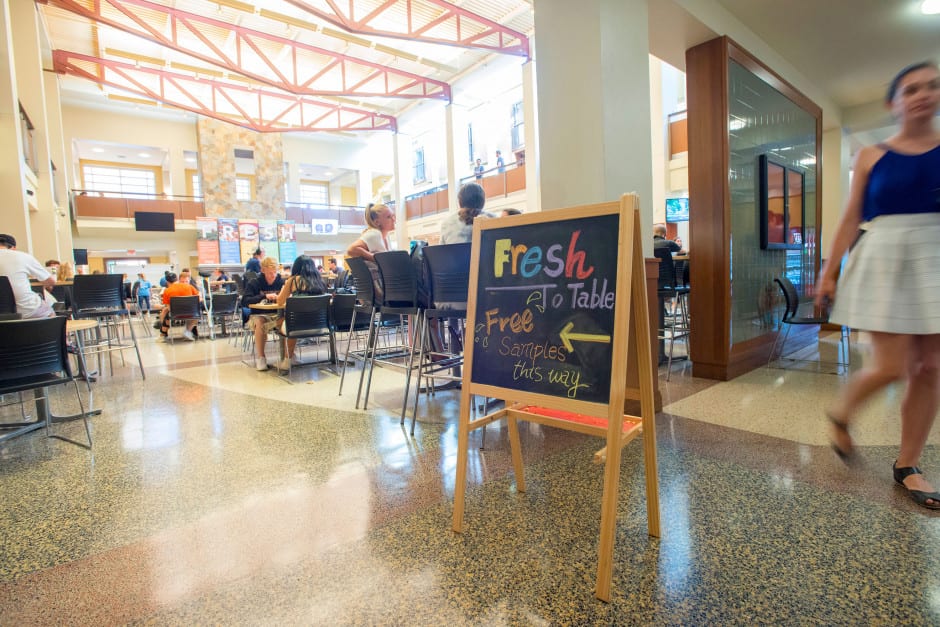
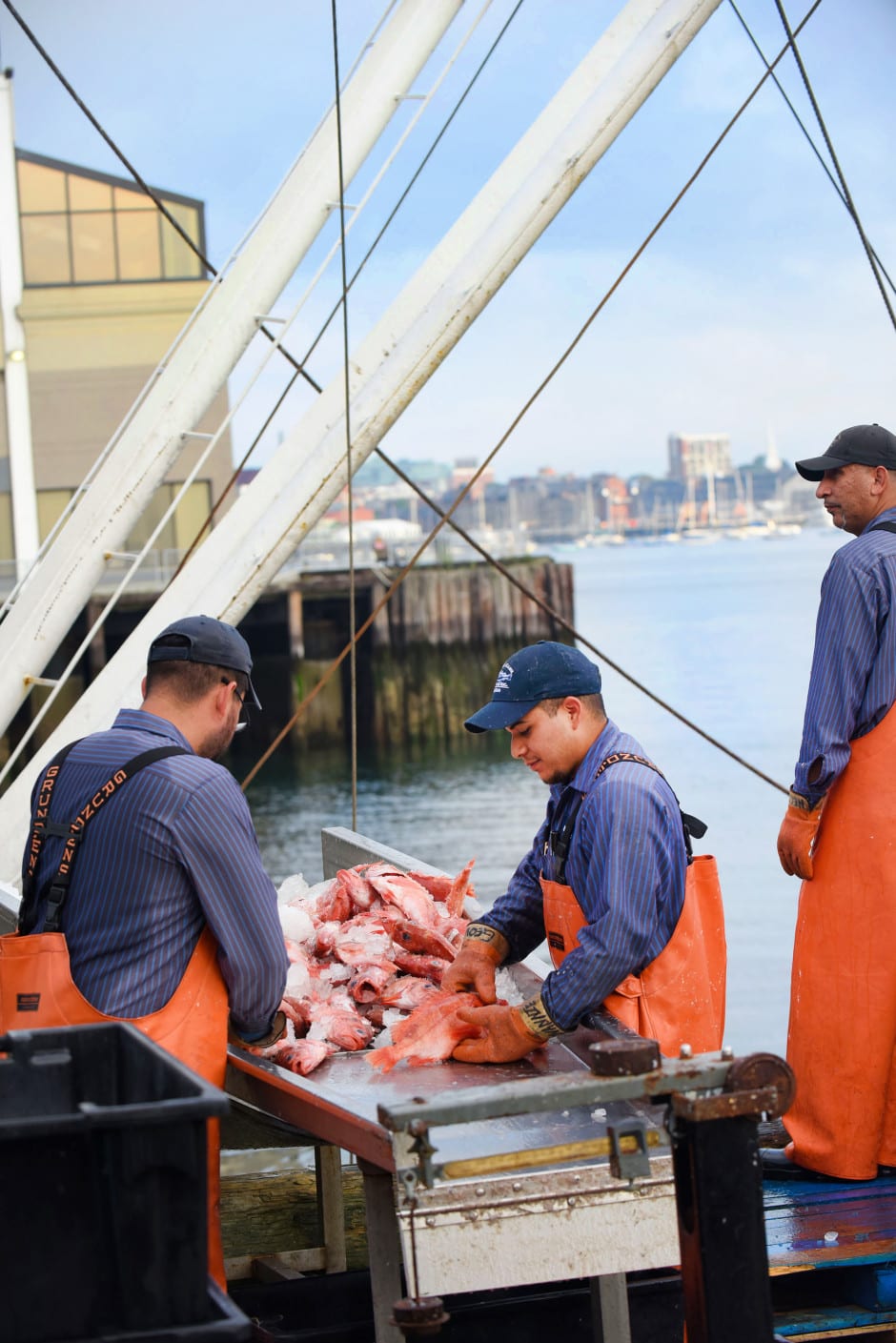
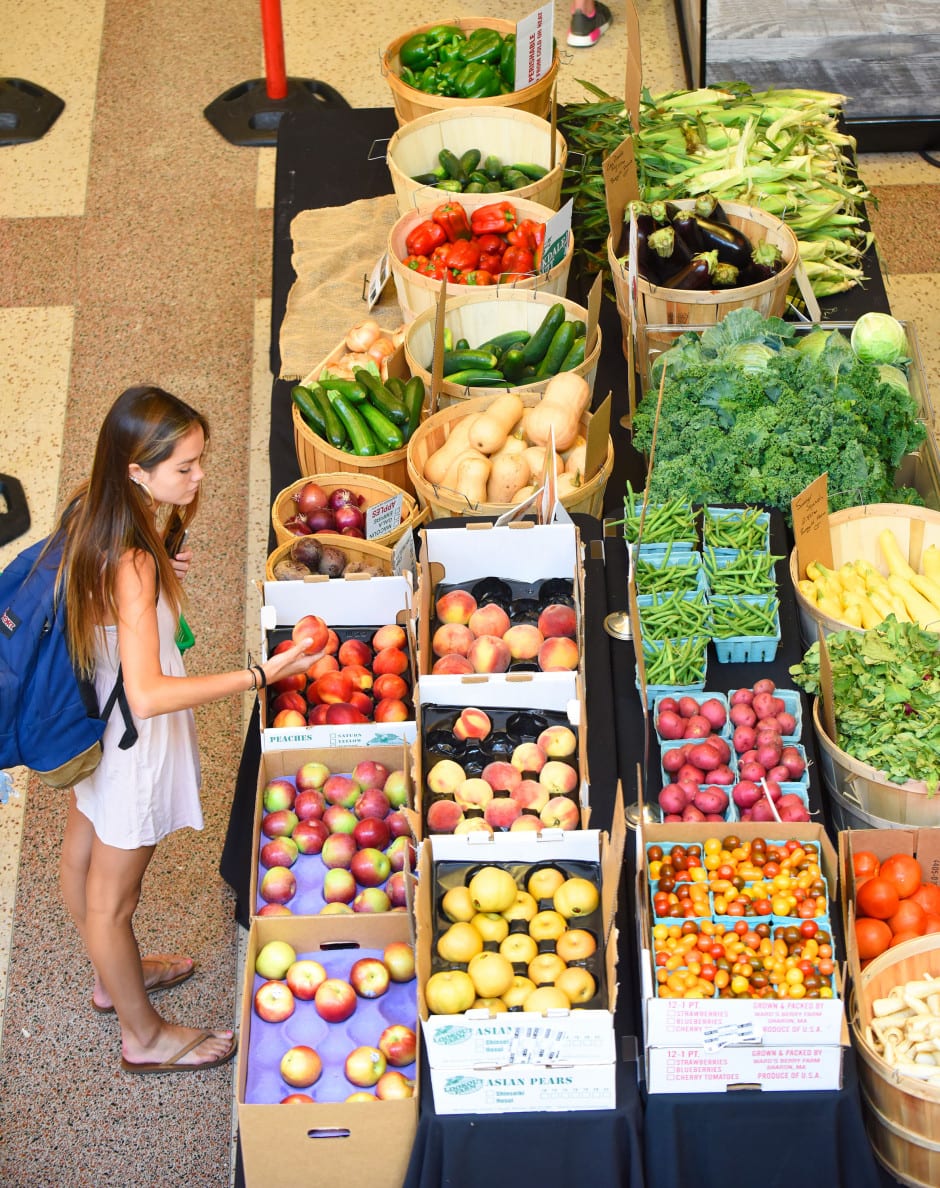
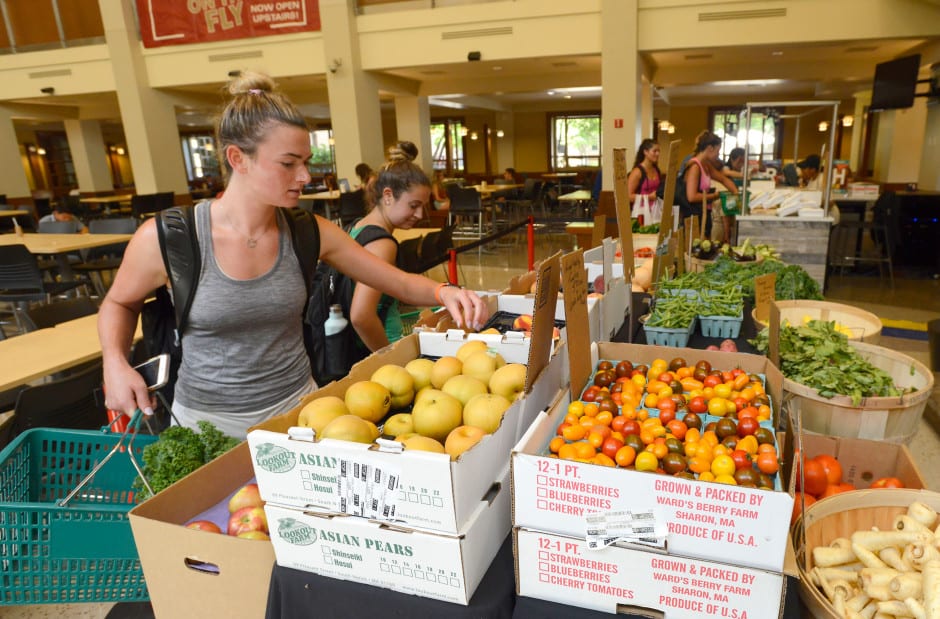
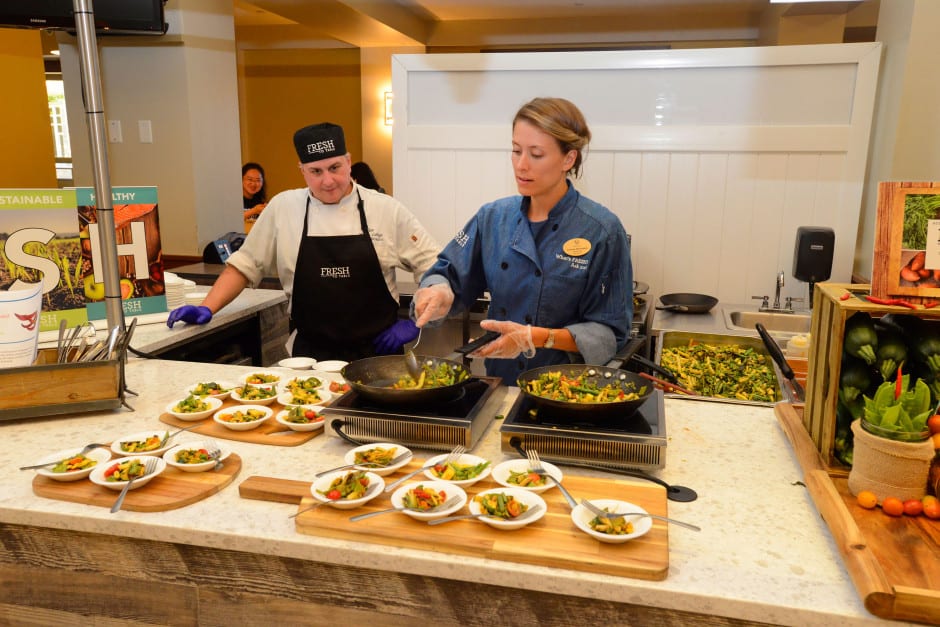
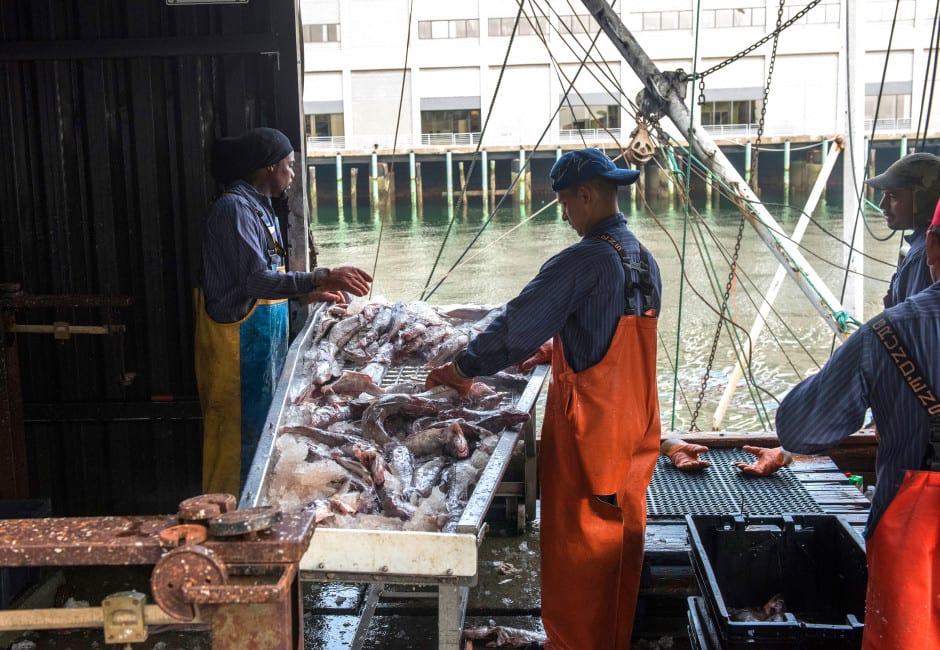
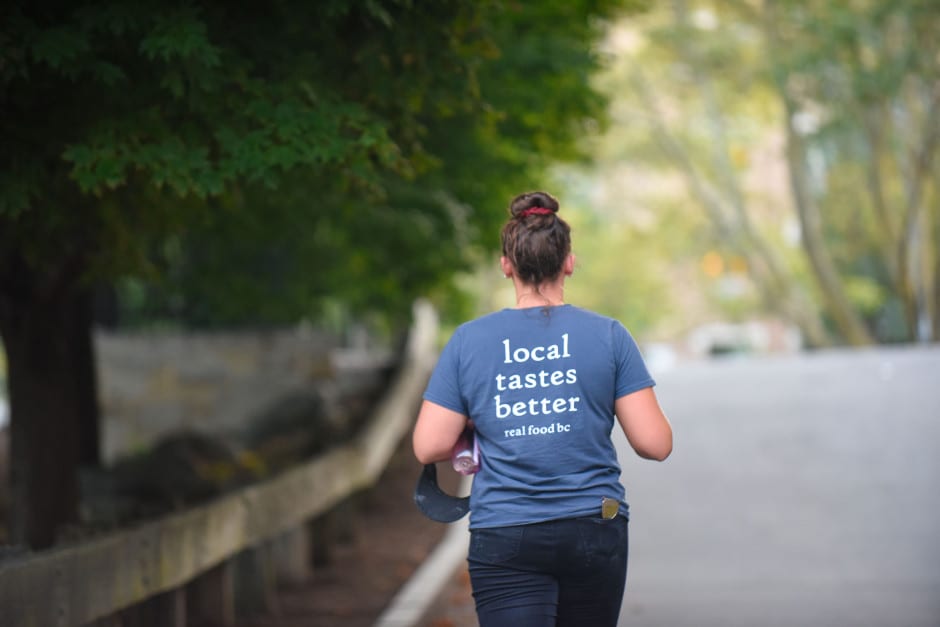
Similar to North Coast, BC Dining leadership has also been reimagining the sustainability framework that they apply to their food purchasing and student-facing programs. Four years ago, Director of BC Dining Services Beth Emery and a cohort of student interns developed a new set of guidelines for the dining program: FRESH. FRESH stands for Fairly-Traded, Regionally-Grown, Equitable, Sustainable, and Healthy. O’Neill explains that serving local and sustainable produce to students – as Ryan has helped to accomplish – is an important first step toward the sustainable transformation of BC’s dining program. But equally important is defining a common language for both students and staff, so everyone at the table knows what terms like “local,” “seasonal,” and “sustainable” actually mean within local, regional and global food systems. Since defining these concepts can be a fraught process, even among food professionals, Emery felt compelled to establish a set of accessible and actionable parameters that clarify what the institution means by such terms.
This past school year, a Kendall Foundation grant supported the BC Dining team in taking FRESH to its second stage with the establishment of the FRESH to Table pilot program – a year-long series of weekly cooking demonstrations designed to educate students about the different components of FRESH. The goal of the program is to “promote healthy, regional, socially just, and sustainable food, focusing on community awareness, education and BC’s Jesuit values,” according to BC Dining Service’s website. After its grand opening in Corcoran Commons in October 2017, FRESH to Table hosted a total of 29 weekly culinary showcases during the 2017-2018 school year, engaging several hundred students each week. Fifty-six percent of participating students reported that the program improved their knowledge of sustainability. Juli Stelmaszyk, BC’s first-ever Manager of Regional and Sustainable Food Systems, joined the BC Dining team in January 2018. She reports that she was immediately impressed by how invested both the dining staff and the students already were in the FRESH to Table program after such a short period of time.
Critical to the efficacy of Fresh to Table as an educational venture has been the Corcoran team’s incorporation of student sustainability interns as ambassadors for the program. “We’re not here to preach,” Cripps says of the BC Dining staff. He, Canny, and the other Corcoran managers realized within the first week of FRESH to Table that facilitating student-to-student engagement would be an indispensable element of educating students about FRESH. They and the rest of BC Dining leadership agree that student interns can engage their peers around complicated topics like FRESH far better than adult staff members could. “Students don’t want adults like us telling them what to do and what to eat and what to try. But they’ll listen to anything their peers say,” reports Stelmaszyk. Promoting interns as the student-facing side of FRESH also empowers those four students to become food systems leaders in their own rights, says Stelmaszyk. This year, the interns developed additional one-time events like a Trash Dinner centered around food waste and a plant-forward pop-up of entirely vegan offerings.
Interns’ insights into their peers’ behaviors and preferences have also helped FRESH to Table succeed. Abbey McHugh is a rising junior at BC, embarking on her second year as a sustainability intern. She explains that her peers “know those buzzwords” that FRESH invokes – such as “sustainable” and “fair trade” – but they don’t actually know what the terms mean. Through a series of surveys and interviews, McHugh and her fellow interns learned that BC students primarily care about healthfulness when making food choices. Armed with that knowledge, the interns have worked to connect that priority of health more explicitly to the FRESH parameters during each weekly demonstration, so that more students become personally invested in sustainable food.
FRESH is also educating folks behind-the-scenes. First Cook Jason Cote, who has been working at BC for more than four years, says that the culinary team has “been able to educate our whole staff from top to bottom” through daily meetings about FRESH ingredients, the circulation of different cooks each week through the FRESH demonstrations, and incorporation of FRESH recipes into the regular menu rotation. “It’s definitely opening our eyes up,” he says, and the exposure is giving cooks “knowledge of what they’re serving on their lines.” Like for O’Neill, being able to “put a face to your food, to [see] where it comes from” is important to Cote. “It makes you appreciate the work that people put into stuff,” he says. And, for Cote, shifting toward FRESH procurement is also just part of being a good citizen.
The program has not been without its challenges. The Corcoran team had to maintain a degree of flexibility throughout the year, especially during the winter and early spring. Without abundant seasonal produce to spotlight, they instead had to get creative and prepare more meals with fish from North Coast Seafoods, make gnocchi with local potatoes, and take the opportunity to highlight the social parameters of FRESH. Coffee, for instance, is not a product local to New England, but BC works with Equal Exchange Coffee to provide sustainable, Fair Trade Certified coffee to students. “It was fun to watch [FRESH to Table] grow” throughout the year, Canny says. They even accumulated a devoted following of students who would approach Canny and his colleagues across campus, eagerly pressing them for preview of the week’s showcase.
The BC Dining team is excited to continue building momentum around FRESH into the fall. They plan to implement small changes at Corcoran based on what they learned last year, such as switching the weekly demonstrations from Thursdays to Wednesdays so students can easily shop for ingredients at the BC farmers market the day after each demonstration. Overall, Stelmaszyk wants to make sure they are keeping FRESH new and relevant (that is, fresh!) for students, and continuing to “define what local means to us.” She and her colleagues aim for FRESH to become embedded within the culture of dining operations and serve as a touchstone for an even larger culture shift across the BC campus. “We want to do the right thing by the university and the Earth; it just makes sense…for us to be doing this,” says Ryan. “I don’t see us going backward. I only see us going forward.”
We want to do the right thing by the university and the Earth; it just makes sense…for us to be doing this. I don’t see us going backward. I only see us going forward.
